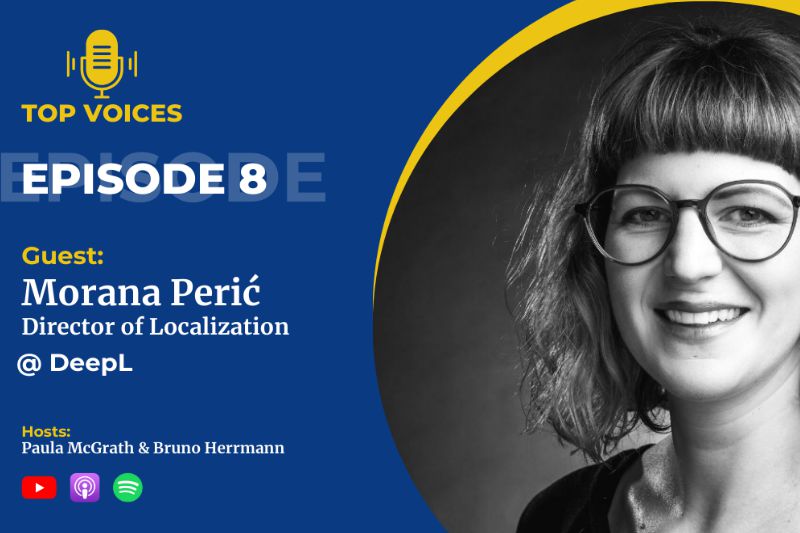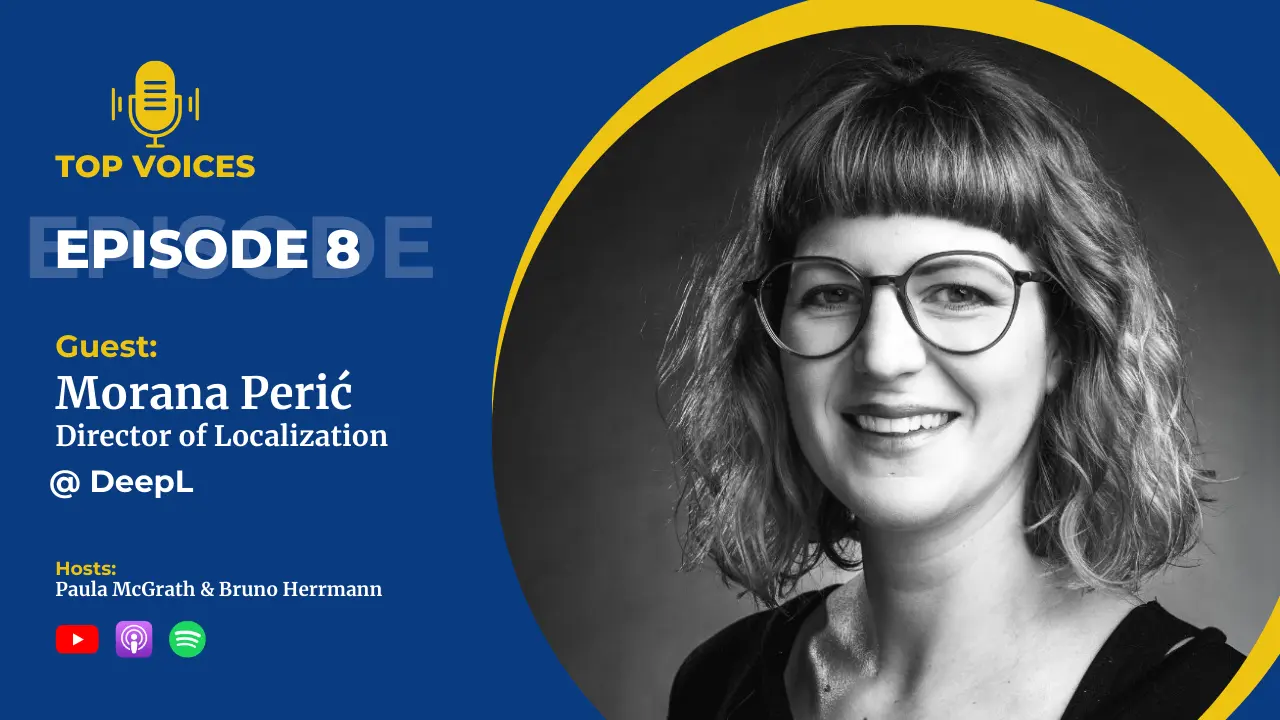In the latest episode of the Top Voices podcast, we sat down with Morana Perić, Director of Localization at DeepL, to explore her career journey, the evolving landscape of localization, and the integration of AI in the language industry.
Morana’s valuable insights shed light on the future of global content operations, the role of linguistic expertise in AI, and the importance of cross-functional collaboration.
From freelancer to industry leader
Morana’s path to leading localization at DeepL was anything but conventional. Born and raised in Zagreb, Croatia, she originally pursued English and Italian language and literature, as well as linguistics. Like many in the language industry, she started out freelancing, working on literary and technical translations, subtitling, and dubbing before securing her first in-house role.
“I started my career like many people, freelancing. I did a lot of different things; literary translations to technical translations, all kinds of stuff.”
Her transition into technology and content management began when she joined Booking.com, a company she describes as having a strong data-driven culture, where A/B testing and analytics were essential tools.
“In Booking, we tested everything. There were like 50 A/B tests running on the website every day. It was this culture of, ‘Let’s not be about opinions, but let’s be about data.’”
From Booking.com, she moved on to Get Your Guide, where she built a localization team from scratch during a period of hypergrowth, before taking on a UX content and localization role at Free Now. This broad experience shaped her holistic approach to content, reinforcing her belief that localization should not be treated as an isolated function, but rather as an integral part of the content supply chain.
The future of localization: AI, data science, and strategic integration
In her current role at DeepL, Morana works at the intersection of language expertise, AI, and data science. She emphasizes the importance of cross-team collaboration, particularly between linguists and engineers, to enhance AI-driven translation quality.
“We have a massive research team, data team, and engineering team. I’ve always enjoyed working with them. You need data for everything, even for language decisions.”
With AI playing an increasingly central role in localization, Morana believes the industry is undergoing a shift where linguists must expand their expertise beyond translation.
“I think the role of a translator, linguist, language specialist is also shifting. It’s not just about tossing content over and translating it. You need to be a little bit of a marketing expert, a little bit of a product expert; you need to know the meaning behind your words.”
She also highlighted DeepL’s commitment to extended human supervision in AI-driven translation, which sets it apart from other large language model (LLM) providers.
“There’s a difference between the volume of data you get and the quality of data you get. We’ve always focused on quality, ensuring our linguists and external collaborators work with the models to improve translations.”
Localization as a value generator, not a cost center
A recurring challenge in localization is proving its business value. Many organizations still view it as a cost center rather than a growth driver. Morana advocates for embedding localization into end-to-end content operations.
“We kind of position ourselves as something separate, and this causes the most problems. The best experiences I’ve had were when localization, UX writers, content design, and marketing writers were all in the same team. Everybody understood the purpose, the impact, and who we were doing this for.”
She advises localization professionals to be proactive in proving their impact, particularly by leveraging data and performance analytics.
“If you can, get data teams involved. Run an experiment. Localize a website for one market and compare conversion rates. When we did this for the Japanese market, we saw a 500% increase in revenue. That’s how you prove value.”
Looking ahead: the next evolution of localization at DeepL
Over the next year, Morana is focused on refining DeepL’s localization approach to enhance collaboration, integrate deeper into product development, and expand the role of linguists.
“We’re shifting from just localizing content to working with teams to research what works best for different markets. Instead of just proofreading and publishing, we want to test variations, analyze user engagement, and contribute to strategic decisions.”
She also sees an opportunity for DeepL’s localization team to act as an internal consultant, ensuring the AI-driven solution meets the needs of localization teams worldwide.
“I almost feel a little bit responsible for all the localization teams out there. I want to make the product better for us, and by extension, for them.”
Morana’s advice for localization professionals
For those looking to advance in the localization industry, Morana emphasizes the importance of curiosity, adaptability, and relationship-building.
“Don’t just knock on other people’s doors – open yours too. Invite people to understand what you do. Build relationships with marketing, UX, and product teams. Once they see your value, they’ll bring you into their processes.”
As localization continues to evolve, industry professionals will need to embrace new roles, integrate with other content teams, and leverage data-driven decision-making. With leaders like Morana at the forefront, the language industry is poised for greater innovation and recognition as a strategic function within global businesses.
Listen to our full discussion with Morana, or hop over to the official Top Voices YouTube channel to watch the discussion in real-time. Don’t forget to also subscribe to Top Voices wherever you get your podcasts!


